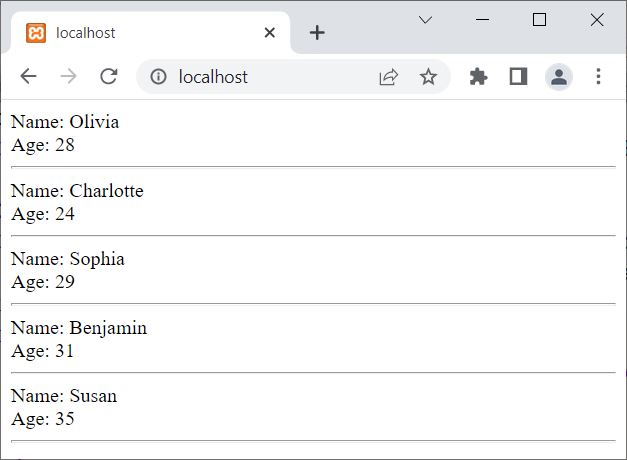- PHP Basics
- Learn PHP
- PHP Comments
- PHP Data Types
- PHP Variables
- PHP Operators
- PHP echo
- PHP print
- PHP echo vs. print
- PHP if else
- PHP switch
- PHP for Loop
- PHP while Loop
- PHP do...while Loop
- PHP foreach Loop
- PHP break and continue
- PHP exit()
- PHP exit() vs. break
- PHP isset()
- PHP Arrays
- PHP print_r()
- PHP unset()
- PHP Strings
- PHP Functions
- PHP File Handling
- PHP File Handling
- PHP Open File
- PHP Create a File
- PHP Write to File
- PHP Read File
- PHP feof()
- PHP fgetc()
- PHP fgets()
- PHP Close File
- PHP Delete File
- PHP Append to File
- PHP Copy File
- PHP file_get_contents()
- PHP file_put_contents()
- PHP file_exists()
- PHP filesize()
- PHP Rename File
- PHP fseek()
- PHP ftell()
- PHP rewind()
- PHP disk_free_space()
- PHP disk_total_space()
- PHP Create Directory
- PHP Remove Directory
- PHP Get Files/Directories
- PHP Get filename
- PHP Get Path
- PHP filemtime()
- PHP file()
- PHP include()
- PHP require()
- PHP include() vs. require()
- PHP mysqli Tutorial
- PHP mysqli Tutorial
- PHP and MySQL Setup
- PHP mysqli: Create Database
- PHP mysqli: Create Table
- PHP mysqli: Insert Record
- PHP mysqli: Update Record
- PHP mysqli: Fetch Record
- PHP mysqli: Delete Record
- PHP mysqli: SignUp Page
- PHP mysqli: LogIn Page
- PHP mysqli: Store User Data
- PHP mysqli Functions
- PHP mysqli_connect()
- PHP mysqli_close()
- PHP mysqli_connect_errno()
- PHP mysqli_connect_error()
- PHP mysqli_query()
- PHP mysqli_fetch_row()
- PHP mysqli_fetch_assoc()
- PHP mysqli_fetch_array()
- PHP mysqli_free_result()
- PHP mysqli_error()
- PHP mysqli_prepare()
- PHP mysqli_stmt_bind_param()
- PHP mysqli_stmt_execute()
- PHP mysqli_stmt_fetch()
- PHP mysqli_stmt_store_result()
- PHP mysqli_stmt_num_rows()
- PHP mysqli_stmt_bind_result()
- PHP mysqli_stmt_get_result()
- PHP mysqli_result class
- PHP mysqli_report()
- PHP error_reporting()
- PHP mysqli_real_escape_string()
- PHP htmlspecialchars()
- PHP Misc Topics
- PHP Object Oriented
- PHP new Keyword
- PHP header()
- PHP getallheaders()
- PHP Cookies
- PHP Sessions
- PHP Date and Time
- PHP GET vs. POST
- PHP File Upload
- PHP Image Processing
PHP fetch() and mysqli_stmt_fetch()
This article is created to cover the two functions of PHP, namely:
Both functions are used to fetch results from a prepared statement into bound variables. The only difference is that fetch() is used with PHP mysqli object-oriented scripts, whereas mysqli_stmt_fetch() is used with PHP mysqli procedural scripts.
PHP fetch()
The PHP fetch() function is used to fetch results from a prepared statement into bound variables in PHP mysqli object-oriented style. For example:
<?php
$conn = new mysqli("localhost", "root", "", "codescracker");
if(!$conn->connect_errno)
{
$stmt = $conn->prepare("SELECT name, age FROM customer");
$stmt->execute();
$stmt->bind_result($x, $y);
while($stmt->fetch())
{
echo "Name: ", $x, "<BR>";
echo "Age: ", $y, "<HR>";
}
}
$conn->close();
?>
The output produced by the above PHP example using the fetch() function is shown in the snapshot given below:

That is, the result fetched into the bound variables is $x and $y.
Note: The mysqli() function is used to open a connection to the MySQL database server in object-oriented style.
Note: The new keyword is used to create a new object.
Note: The connect_errno is used to get or return the error code (if any) from the last connect call in object-oriented style.
Note: The prepare() function is used to prepare an SQL statement before its execution on the MySQL database in object-oriented style, to avoid SQL injection.
Note: The execute() function is used to execute a prepared statement on the MySQL database in object-oriented style.
Note: The bind_result() function is used to bind variables to a prepared statement for result storage in object-oriented style.
Note: The close() function is used to close an opened connection in object-oriented style.
PHP fetch() Syntax
The syntax of the fetch() function in PHP is:
$mysqli_stmt -> fetch()
PHP mysqli_stmt_fetch()
The PHP mysqli_stmt_fetch() function is used to fetch results from a prepared statement into bound variables in PHP mysqli procedural style. For example:
<?php
$conn = mysqli_connect("localhost", "root", "", "codescracker");
if(!mysqli_connect_errno())
{
$stmt = mysqli_prepare($conn, "SELECT name, age FROM customer");
mysqli_stmt_execute($stmt);
mysqli_stmt_bind_result($stmt, $x, $y);
while(mysqli_stmt_fetch($stmt))
{
echo "Name: ", $x, "<BR>";
echo "Age: ", $y, "<HR>";
}
}
mysqli_close($conn);
?>
Note: The mysqli_connect() function is used to open a connection to the MySQL database server in procedural style.
Note: The mysqli_connect_errno() function is used to get or return the error code (if any) from the last connect call in procedural style.
Note: The mysqli_prepare() function is used to prepare an SQL statement before its execution on the MySQL database in procedural style, to avoid SQL injection.
Note: The mysqli_stmt_execute() function is used to execute a prepared statement on the MySQL database in procedural style.
Note: The mysqli_stmt_bind_result() function is used to bind variables to a prepared statement for result storage in procedural style.
Note: The mysqli_close() function is used to close an opened connection to the MySQL database in procedural style.
PHP mysqli_stmt_fetch() Syntax
The syntax of the mysqli_stmt_fetch() function in PHP is:
mysqli_stmt_fetch($mysqli_stmt)
« Previous Tutorial Next Tutorial »